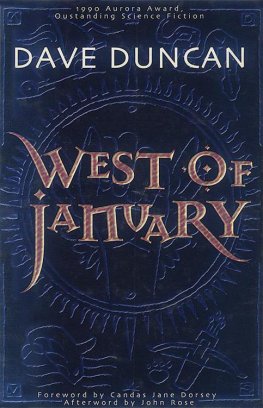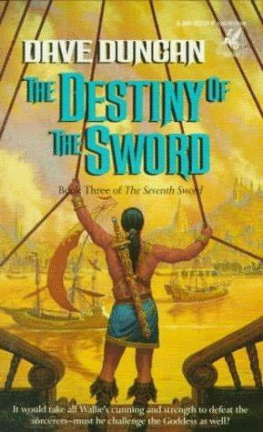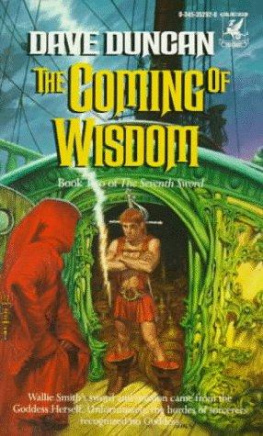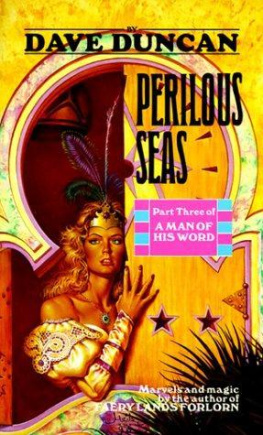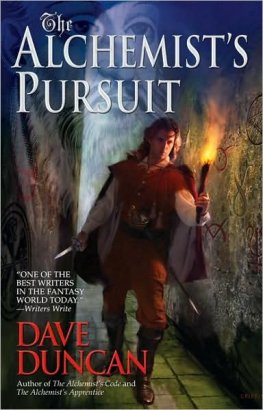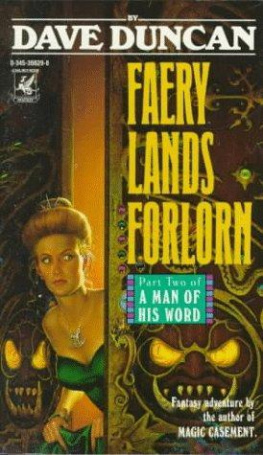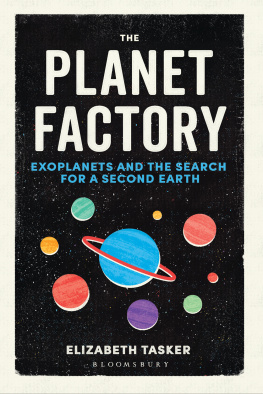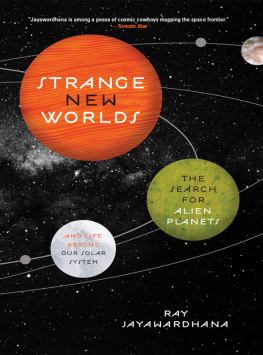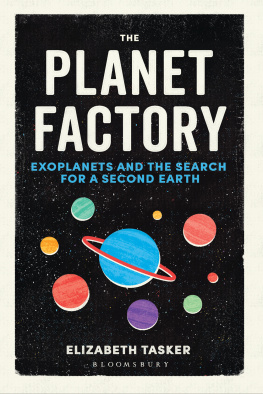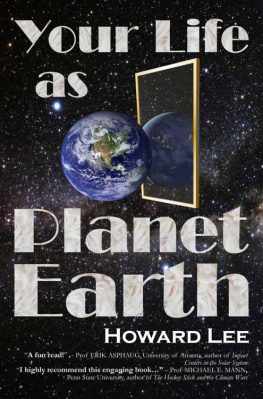Dave Duncan
WEST OF JANUARY
The probe telemetry was wrong! Close, but not close enoughthe damned things not locked on the star as we thought Revolution264.6 days; rotation263. 6. Not much of a difference, is it?
But do you realize what that does to all our plans?
MIKE ANGELI, PLANETOLOGIST, COLONIZATION EXPEDITION
We named the ship well, didnt wethe Mayflower? With a hundred years of daylight, were all going to be mayflies!
CELESTE GABRIEL, SOCIOLOGIST, COLONIZATION EXPEDITION
For a thousand years in thy sight are but as yesterday when past, and as a watch in the night. Thou earnest them away as with a flood; they are as a sleep: in the morning they are like grass which groweth up; in the evening it is cut down, and it withereth
So teach us to number our days that we may apply our hearts unto wisdom.
PSALM 90

Dear Reader:
I address you here in a short screed commissioned as a foreword, but if I were the editor of this most excellent series of classic Canadian speculative fiction reprints, Id put it at the end, because its full of spoilers. I cant help it. In order to talk about Dave Duncan and West of January I have to actually talk about it, so if you find this letter from me at the start of the book, no one will mind if you skip it until youve read the book. Thats what a bunch of you did already, I know it. Who wants to read a foreword when theres an unread Dave Duncan to dive into?
If you just picked up this book out of idle curiosity, you might want to hang in while I explain to you who Dave Duncan is. Hmmm. Lets see
What do you get when you cross a rapid typist with a guy with a classical education or a love of the classics (comes out to the same thing) and let him loose on the speculative fiction world? You get Dave Duncan, a menace to crowded bookshelves everywhere.
Dave is the kind of writer who makes slow writers envious. He does everything we do but faster, backwards and in high heelsoops, wrong joke. Try again. He writes about five books a year, and theyre all good. No joke. Dave has written so many books, and so many each year, that the publishers have taken to putting out some of them under pseudonyms, so as not to startle the public or to set up expectations the rest of us poor drudgesI mean, slower writerscant live up to. But its an open secret, for example, that Sarah Franklin happens to share Daves liking for the Iliad and the Odysseyand she may even have the same tidily cropped salt-and-pepper beard that graces Daves puckish face. (Poor woman. The beard looks good on Dave, but on the writer of a sexy, fascinating historical novel making a major heroine out of a minor woman character from the story of the Trojan War? Well.)
Dave used to be a geologist, but in the original edition of this book, which I have before me, he listed a few other recreational interests he pursued during the 30 years of his geology career: astronomy, acting, statistics, history, painting, hiking, model ship building, photography, computer programming, chess, genealogy, and stock market speculation. He then wrote, An attempt to add writing to this list backfiredhe met with enough encouragement that he took up writing full time. Now his hobby is geology. That was in 1989. Who knows what else is on the list now?
In the copy of the first edition which I own, Dave has written: Candas, I am sure you will enjoy getting your teeth into thisor do I mean claws? It had been 12 years since August of 1989, but now I get my chance. Your call, Dave, whether you think what follows is teeth or claws! The inscription goes on to say: P.S. Try not to explode before you get to the end. But I admire and like this book. As series editor of Tesseract Books from 1994 to the present, I was even offered the chance to reprint it, but publishing being a perilous endeavor, we never did get to a reprint series. How delighted I was to hear that Salman Nensi and Bakka Books was going to bring out this edition, and how further delighted I am to be asked to introduce it. If anyone tries to convince you that SF publishers compete, especially in Canada, laugh in their face. We are all in the service of the wonderful writers who abound in this field in this country, of whom Dave Duncan is one of the foremost (and most prolific), and thats my segue back to West of January. This is also where the spoiler warning takes effect.
West of January is one of Daves early books. Hed only written five before this one. (That had been published, that is. Who knows what secret manuscripts he was reserving so as not to seem too greedy about his market share?) Shadow and A Rose-Red City, the early books, are out of print and deserve republication. (Duncan fans made since then would fall upon them with delight, I should think, as they willas you haveon this new edition of West of January.) Then the first of the swordsmen fantasy trilogies. The Seventh Sword books hooked a bunch of trilogy readers, young and old, on the Duncanesque view of the world: the one in which the story seems to be slicing right down the middle of the genre sward, but if you go along for the ride, it proves to have a few hidden twists and spins. Read Robert Runts critical writing about Daves books if you want more detail.
West of January was something different. Or maybe not, but at least in terms of setting, it was only ostensibly fantasy. In fact, it is one of Duncans most interesting thought experiments, and the premise is relentlessly SFnal: whats it like to try to set up a civilization on a planet with the rotation just slightly shorter than its revolution. Unlike Earths moon, for which both of revolution and rotation are the same period, which is why the moon turns the same face to its primary, Earth, all the time, the planet Vernier slowly, slowly changes the face it turns to its sun, and the day creeps destructively around the planet on a cycle of many hundreds of years. Its a pure science fiction premise, and a complicated one.
But Dave doesnt waste much time with the expository lumps. He gives us the key to the story in his epigrapha Duncan signature, by the way, so all you lazy readers who skip the twiddly bits in the italics on the page before the real story, take warning from me on this: you are missing out on core thematic material. (Remember Robert McKees dictum: Theme is the writerly perspective on the significance of the story.) Then Dave gets right down to business.
West of January hinges on chronology, so narratively, it is not only obvious but also subtle (take that, my ingenuous friend!) to structure the story chronologically, along the life cycle of a single resident of Vernier, and to name the regions of the planet after units of time. Knobil (can there be any symbolism in the name?) is born west of January, travels through to April or May or so (from what I can figure of the maps), and ranges from Wednesday north and south tooh, I told you not to read this until after! All right, forget the spoilers. Lets make them teasers then. Knobil goes all over the place and had adventures. He has a lot of sex. He sires a lot of children. He learns a lot of cool stuff. Just the sort of thing to attract the entertainment-oriented reader.
Its true, if you read this book you will have a lot of fun too. But I have very bad news for you. If you read this book you might learn something. You might have to think. And the things you might have to think about are both the great human themes and the local human problems: the nature of civilization; when its wrong to kill; man, woman, birth, death, infinity (oops, wrong genre, wrong medium, and showing my age as well); gender rolesreallyand the survival reasons for tribal family structures; how to use your intelligence; who is God. Dave likes to pretend hes doing all this writing stuff for pure fun, to entertain people, to frolicbut he isnt. He has something to say.

